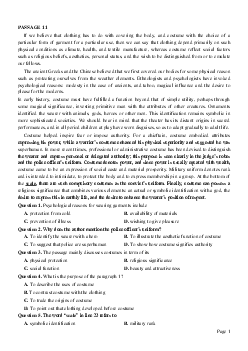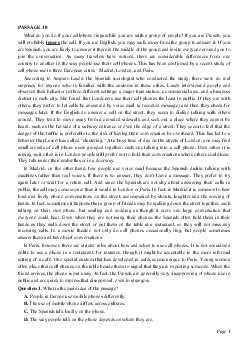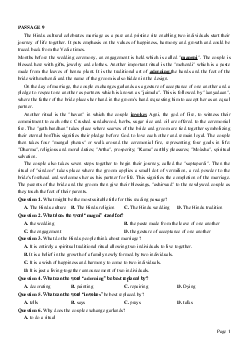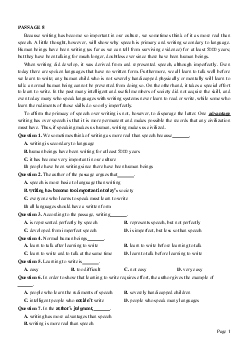



Preview text:
PASSAGE 23
Thanks to our modern lifestyle, with more and more time spent sitting down in front of computers than
ever before, the number of overweight people is at a new high. As people frantically search for a solution
to this problem, they often try some of the popular fad diets being offered. Many people see fad diets as
innocuous ways of losing weight, and they are grateful to have them. Unfortunately, not only don’t fad
diets usually do the trick, they can actually be dangerous for your health.
Although permanent weight loss is the goal, few are able to achieve it. Experts estimate that 95 percent of
dieters return to their starting weight, or even add weight. While the reckless use of fad diets can bring
some initial results, long-term results are very rare.
Nonetheless, people who are fed up with the difficulties of changing their eating habits often turn to fad
diets. Rather than being moderate, fad diets involve extreme dietary changes. They advise eating only one
type of food, or they prohibit other types of foods entirely. This results in a situation where a person’s
body doesn’t get all the vitamins and other things that it needs to stay healthy.
One popular fad diet recommends eating lots of meat and animal products, while nearly eliminating
carbohydrates. A scientific study from Britain found that this diet is very high in fat. According to the
study, the increase of damaging fats in the blood can lead to heart disease and, in extreme cases, kidney
failure. Furthermore, diets that are too low in carbohydrates can cause the body to use its own muscle for
energy. The less muscle you have, the less food you use up, and the result is slower weight loss.
Veteran dieters may well ask at this point, “What is the ideal diet?” Well, to some extent, it depends on
the individual. A United States government agency has determined that to change your eating habits
requires changing your psychology of eating, and everyone has a different psychology. That being said,
the British study quoted above recommends a diet that is high in carbohydrates and high in fiber, with
portions of fatty foods kept low. According to the study, such a diet is the best for people who want to
stay healthy, lose weight, and keep that weight off. And, any dieting program is best undertaken with a doctor’s supervision
Question 1. What is the author’s main point?
A. Reckless fat dieting probably takes weight off the fastest.
B. Most people shouldn’t try to lose weight
C. High-protein diets can make you sick.
D. Fad diets are ineffective and unsafe; high-carbohydrate, low-fat diets are best.
Question 2. According to the passage, why are there more overweight people nowadays?
A. They are using fad diets.
B. They spend a lot of time in front of computers.
C. They have heart disease.
D. They are eating more protein than ever before.
Question 3. After losing weight by dieting, what usually happens to people?
A. they have kidney failure
B. they gain weight back again
C. they keep the weight off
D. they have less muscle
Question 4. Which of the following best expresses the essential information in paragraph 3?
A. Fed up people turn to fad diets, which, being too extreme, don’t give the body everything it needs.
B. People are fed up with fad diets and turn to diets which provide what the body needs.
C. People prefer fad dieting to moderate dieting because it requires fewer foods to give the body what it needs. Page 1
D. Fad diets give fed up people the moderate dietary changes they need to get all the required vitamins.
Question 5. Which is not mentioned as an effect of the meat and animal product diet? A. heart disease B. slower weight loss
C. psychological changes D. kidney failure
Question 6. According to the passage, why does the ideal diet depend in the individual?
A. The less muscle you have, the less food you use up.
B. Everyone can gain weight back.
C. Everyone has a different psychology.
D. Everyone likes different food.
Question 7. According to the passage, what diet does a British study recommend?
A. a meat and animal product diet
B. a diet high in carbohydrates, low in fiber, and high in fat.
C. a fad diet but with healthier foods.
D. a diet high in carbohydrates, low in fiber, and low in fat.
Question 8. The word “ innocuous” in the paragraph 1 can be best replaced by . A. helpful B. harmless C. effective D. beneficial
Question 9. What does the word “this’ in paragraph 3 refer to?
A. changing eating habits.
B. that people change their habits.
C. extreme dietary change
D. eating one type of food.
Question 10. What does the writer imply in the last paragraph?
A. There are many different ways of dieting
. B. The best way of dieting is psychological.
C. There is no such a thing called best diet for all.
D. Dieting takes a lot of psychology. ĐÁP ÁN 1-D 2-B 3-B 4-A 5-C 6-C 7-D 8-B 9-D 10-C
LỜI GIẢI CHI TIẾT Question 1:
Ý chính của tác giả là gì?
Skimming những câu đầu và cuối của bài khóa, các key words trong các câu ở đoạn giữa.
+ “not only don’t fad diets usually do the trick, they can actually be dangerous for your health.” = chế độ
ăn kiêng thịnh hành chẳng những là trò lừa dối mà còn có hại cho sức khẻo của bạn.
+ “the British study quoted above recommends a diet that is high in carbohydrates and high in fiber, with
portions of fatty foods kept low. According to the study, such a diet is the best for people who want to
stay healthy, lose weight, and keep that weight off.” = ăn các đồ ăn giàu carbohydrates và nhiều chất xơ,
giảm đồ béo rất tốt cho người muốn sống khẻo mạnh và giảm béo. Page 2
-> Chế độ ăn kiêng thịnh hành không hiệu quả và an toàn, một chế độ ăn giàu carbohydrates và ít chất béo mới là tốt nhất. Question 2:
Theo bài khóa, tại sao ngày nay lại có nhiều người bị béo phì?
“Thanks to our modern lifestyle, with more and more time spent sitting down in front of computers than
ever before, the number of overweight people is at a new high” => Do cuộc sống hiện địa, mội người ngồi
ì trước máy tính nhiều hơn nên số lượng người béo phì tăng lên. Question 3:
Sau khi giảm cân bằng ăn kiêng, điều gì luôn xảy ra đối với chúng ta?
“Experts estimate that 95 percent of dieters return to their starting weight, or even add weight.” = Các
chuyên gia ước tính rằng 95% những người ăn kiêng bị béo trở lại và thậm chí là tăng cân hơn. Question 4:
Câu nào dưới đây diễn tả chính xác nhất thông tin cần thiết trong đoạn 3?
+ “people who are fed up with the difficulties of changing their eating habits often turn to fad diets.
Rather than being moderate, fad diets involve extreme dietary changes. ..... This results in a situation
where a person’s body doesn’t get all the vitamins and other things that it needs to stay healthy.” =>
Những người chán nản với những khó khăn của việc thay đổi thói quen ăn uống thường tìm đến cách ăn kiêng thịnh hành.
Điều này dẫn đến tình trạng cơ thể không có đủ vitamin và những thứ cần thiết khác để khỏe mạnh. Question 5:
Điều gì không được nhắc đến như là hậu quả của các bữa ăn có thịt già chế biến từ động vật?
Tất cả các đáp án khác đúng vì:
“the increase of damaging fats in the blood can lead to heart disease and, in extreme cases, kidney failure.
Furthermore, diets that are too low in carbohydrates can cause the body to use its own muscle for energy.
The less muscle you have, the less food you use up, and the result is slower weight loss. “
-> Không có C. thay đổi về tâm lý Question 6:
Theo bài khóa, tại sao chế độ ăn kiêng lý tưởng lại phụ thuộc vào từng đối tượng?
Đoạn cuối: “to change your eating habits requires changing your psychology of eating, and everyone has
a different psychology.”=> Để thay đổi thói quen ăn uống của bạn thì cần phải thay đổi cả tâm lý về ăn
uống, mỗi người có một tâm lý khác nhau. Question 7:
Theo bài khóa, một nghiên cứu ở nước Anh đã khuyên nên theo chế độ ăn kiêng như thế nào?
“the British study quoted above recommends a diet that is high in carbohydrates and high in fiber, with
portions of fatty foods kept low.” = ăn các đồ ăn giàu carbohydrates và nhiều chất xơ, giảm đồ béo rất tốt
cho người muốn sống khẻo mạnh và giảm béo. Question 8:
Innocuous (a): vô hại, không có hại = harmless Useful (a): có ích Beneficial (a): có lợi Page 3 Effective (a): hiệu quả. Question 9:
Từ “this” trong đoạn 3 chỉ đến từ nào? => Thay các lựa chọn vào vị trí từ ‘this” xà xét nghĩa của câu.
“They advise eating only one type of food, or they prohibit other types of foods entirely. This results in a
situation where a person’s body doesn’t get all the vitamins and other things that it needs to stay healthy.”
-> Chế độ ăn kiêng thịnh hình khuyên mọi người chỉ ăn 1 loại thức ăn duy nhất, cấm ăn các loại khác
hoàn toàn. “Việc ăn 1 thứ” như vậy khiến cơ thế thiếu vitamin và các chất cần thiết. Question 10:
Tác giả ngụ ý gì trong đoặn văn cuối ? => Đọc thật kỹ cả đoạn và đưa ra kết luận.
“to some extent, it depends on the individual. ........to change your eating habits requires changing your
psychology of eating, and everyone has a different psychology.” => Ở 1 mức độ nào đó, chế độ ăn còn
phụ thuộc vào từng người, để thay đổi thói quen ăn uống thì cần phải thay đổi tâm lý ăn uống và mỗi
người lại có 1 tâm lý khác nhau. => Không có một chế độ ăn nào là tốt nhất cho tất cả mọi người (mỗi
người lại áp dụng 1 chế độ riêng) Page 4




